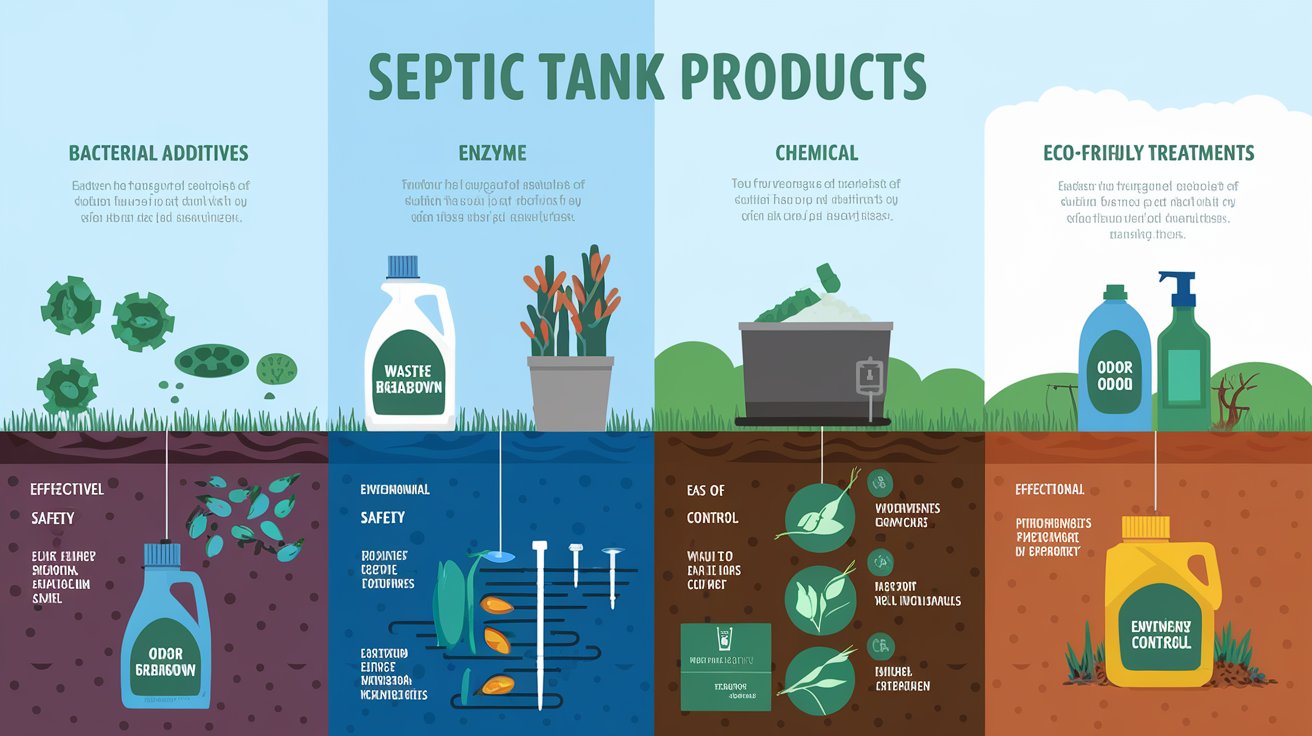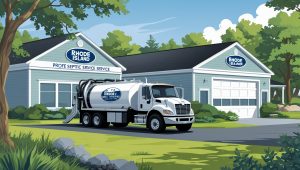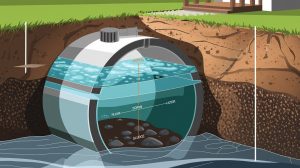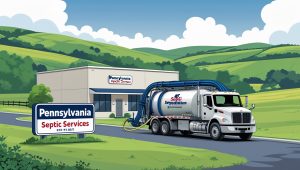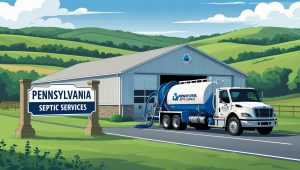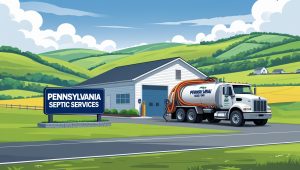Understanding Septic Tank Products
Proper maintenance of your septic system is essential to ensure it runs smoothly and efficiently. One of the most effective ways to keep your system in top shape is by using the right septic tank products. When comparing septic products, it’s important to choose those that enhance waste breakdown, prevent blockages, and maintain a healthy balance of bacteria in your system. From bacterial additives to eco-friendly solutions, these products play a vital role in septic system care. In this guide, we’ll introduce you to the various types of septic tank products available, helping you understand which ones are most suitable for your needs. Whether you’re looking for effective treatments or environmentally friendly options, this overview will help you make informed decisions about maintaining your septic system.
Table of Content
- Understanding Septic Tank Products
- What Are Septic Tank Products?
- Types of Septic Tank Products
- How to Choose the Right Septic Tank Products
- Comparing Popular Septic Tank Products
- Septifix
- Septic Permit Links by State
What Are Septic Tank Products?
Septic tank products are specially designed items used to maintain, clean, and improve the efficiency of septic systems. These products help break down solid waste, prevent blockages, and maintain the overall health of the septic tank. Using the right products can extend the life of your septic system and reduce the need for costly repairs. There are various types of septic tank products available, each serving a specific purpose.
Common septic tank products include bacterial and enzyme additives, chemical treatments, cleaning products, and eco-friendly solutions. Bacterial additives introduce beneficial bacteria to the system, which help break down waste more efficiently. Enzyme products, on the other hand, assist in decomposing organic matter. Chemical treatments may be used occasionally to tackle stubborn issues like clogs or foul odors. Cleaning products help prevent the buildup of sludge and solids in the tank, ensuring everything flows smoothly. When comparing septic products, it’s important to choose those that enhance waste breakdown, prevent blockages, and maintain a healthy balance of bacteria in your system.
The key to a successful septic maintenance routine is understanding the different types of products available and choosing the right ones based on your system’s needs.
When comparing septic products, understanding their different roles will help you choose the most effective options for your system.
Types of Septic Tank Products
When comparing septic products, consider their effectiveness, environmental impact, and ease of use to find the right fit for your needs. There are several types of septic tank products available, each designed to serve a specific function in maintaining a healthy and efficient septic system. Let’s explore the most common types:
Septic Tank Additives
Septic tank additives are products that introduce bacteria and enzymes into your septic system to help break down organic waste. These products are often used to enhance the natural decomposition process inside the tank.
- Bacterial Additives: These contain beneficial bacteria that help decompose solid waste in the tank. They can reduce the buildup of sludge and prevent clogging, improving the overall efficiency of the system.
- Enzyme Additives: Enzyme products aid in breaking down organic matter, such as fats, oils, and grease, which are typically difficult for the bacteria to digest. These additives help keep the system running smoothly by preventing the accumulation of these substances.
Septic Tank Treatments
Septic tank treatments include chemicals or biological agents that help maintain or restore the health of the septic system. These treatments are typically used to clear blockages, eliminate odors, or provide extra care during routine maintenance.
- Chemical Treatments: These often contain harsh chemicals designed to dissolve grease, soap, and other organic matter that may clog pipes or interfere with the functioning of the tank. Chemical treatments are powerful, but they should be used sparingly to avoid disrupting the delicate bacterial ecosystem of the septic system.
- Biological Treatments: These are similar to bacterial additives but are formulated to address specific issues such as odors or blockages. They help promote the natural bacterial action inside the tank and can be an eco-friendly alternative to chemical solutions.
Septic System Cleaning Products
These products are designed to clean and maintain the septic system, particularly the pipes and tank. Regular cleaning is necessary to prevent the buildup of sludge and scum, which can cause blockages and reduce the efficiency of the system.
- Pump Cleaning Products: These are used during the routine pumping of the septic tank. They help break down the waste and reduce the amount of solids that need to be removed, making the pumping process more efficient.
- Pipe Cleaning Solutions: Specially formulated to clear blockages in the pipes leading to and from the septic tank, these products can prevent major clogs from forming, ensuring a smooth flow of waste.
Eco-Friendly Septic Tank Products
As environmental concerns grow, many homeowners are opting for eco-friendly septic tank products. These products are made from natural ingredients and are designed to be safe for the environment while still maintaining the effectiveness of the septic system.
- Organic Additives: These include natural enzymes, bacteria, and other eco-friendly substances that help break down waste without harming the environment. They are particularly popular for those who want to reduce their chemical footprint.
- Non-Toxic Cleaners: These septic cleaners are free from harsh chemicals, making them a safer option for both the system and the surrounding ecosystem. They are effective at breaking down waste while being gentle on the environment.
Each type of septic tank product serves a unique purpose, and understanding how they work can help you make the best choice for your system’s maintenance. Whether you’re looking to break down waste, prevent clogs, or opt for an eco-friendly solution, there are products available to meet your needs.
How to Choose the Right Septic Tank Products
Choosing the right septic tank products for your system requires careful consideration of several factors. The wrong product can be ineffective or even harmful to the environment or your septic system. Here’s what to keep in mind when selecting the best products for your needs:
1. System Size and Usage
The size of your septic system and how much it’s used play a crucial role in determining which products are most effective. Larger systems or those with higher usage may require stronger treatments or additives to maintain efficiency. For smaller or less frequently used systems, milder products may suffice.
- For larger systems: You might need products with a higher concentration of bacteria or enzymes to ensure that waste is broken down efficiently.
- For small or lightly used systems: Choose products with a balanced formula that won’t overwhelm the system but still maintains its health.
2. Frequency of Maintenance
Consider how often you need to maintain your septic system. If you’re performing routine maintenance every year, you might only need basic additives or eco-friendly options. For systems that require more frequent attention due to issues like blockages or odors, stronger chemical or biological treatments may be necessary.
3. Environmental Impact
With growing concerns about environmental sustainability, many homeowners prefer to choose eco-friendly septic tank products. Organic and non-toxic additives, cleaners, and treatments help minimize your environmental footprint while still promoting healthy septic system operation.
- Look for products labeled as biodegradable and free from harsh chemicals like phosphates, which can harm local water supplies.
- Choose products with natural ingredients like enzymes or bacteria, which break down waste without releasing harmful chemicals into the environment.
4. Local Regulations
Different regions have varying regulations concerning septic system maintenance, particularly regarding the use of chemical treatments. It’s important to familiarize yourself with local regulations to ensure that the products you choose comply with those rules. Some areas may have restrictions on certain chemicals that are harmful to the environment or water supplies.
5. Product Effectiveness
Not all septic tank products are created equal. When selecting a product, check reviews, case studies, and manufacturer recommendations to gauge its effectiveness. Customer feedback can offer insight into the product’s performance and its long-term results.
- Look for products that are backed by research or recommended by septic system professionals.
- Ensure the product is suited for your specific issue: whether it’s breaking down grease, controlling odors, or preventing clogs.
6. Ease of Use
The best septic tank products are those that are easy to use. Look for products that come with clear instructions and are simple to apply or add to the system.
- Powder or tablet products may be more convenient for regular use compared to liquid treatments, which may require more careful handling and application.
Choosing the right product isn’t just about solving immediate problems—it’s about maintaining a balanced, healthy septic system in the long term. Taking the time to understand your system’s needs and the environmental impact of the products you choose will ensure that your septic system remains in good condition and operates efficiently. When comparing septic products, it’s important to consider factors like system size, usage frequency, and environmental impact.
Comparing Popular Septic Tank Products
When comparing septic products, take into account reviews, case studies, and customer feedback to gauge their effectiveness. With so many septic tank products available, it can be difficult to determine which one will best meet your needs. To help guide your decision, we’ve compared some of the most popular and effective septic tank products on the market. Here’s an overview of the key factors to consider when comparing these products:
1. Effectiveness
Effectiveness is one of the most important factors when choosing septic tank products. A good product should break down waste, prevent blockages, and improve the overall functioning of the septic system.
- Bacterial Additives: Products like Rid-X and SepticSaver are popular choices. These brands contain a mix of beneficial bacteria that help break down organic waste, reducing the buildup of sludge and scum in your tank. They’re highly effective in maintaining a healthy balance of bacteria inside the system.
- Enzyme Additives: Products like Green Gobbler and BioForce use enzymes to digest organic material like grease, oils, and fats, which can be difficult for bacteria alone to break down. These are particularly useful for households with heavy kitchen waste.
- Chemical Treatments: Septic Treatment by Earthworm Technologies is a strong chemical product that clears up clogs and odors. It’s effective in clearing blockages caused by grease or soap buildup but should be used sparingly to avoid harming the beneficial bacteria in your tank.
2. Environmental Safety
As more people prioritize sustainability, eco-friendly products have become a popular choice. Many septic tank products are now available in non-toxic, biodegradable formulas that are gentle on the environment.
- Eco-Friendly Additives: Brands like Septic Tank Treatment by Molly’s Suds use organic ingredients and contain no harmful chemicals. These products are safe for both your septic system and the surrounding ecosystem, making them ideal for environmentally-conscious homeowners.
- Natural Cleaners: CedarFresh offers natural septic tank cleaners made from essential oils, which are gentle yet effective in clearing odors and maintaining the health of your system without harming the environment.
3. Ease of Use
The ease of application is another critical factor when choosing septic tank products. Some products require more frequent application, while others provide long-lasting results with fewer maintenance steps.
- Convenient Tablets or Powders: Products like Rid-X Septic Tank Treatment Tablets and Bio-Active Septic Tank Tablets are highly convenient. They simply require you to drop a tablet into your toilet, and the active ingredients dissolve, making the process easy and straightforward.
- Liquid Additives: Liquid treatments such as Septic Treatment by Earthworm Technologies may require a more involved process, as they often need to be poured into the tank directly or flushed down the toilet. However, these treatments are often more concentrated and can have faster results.
4. Cost
While septic tank products can be a valuable investment in system maintenance, the cost can vary widely depending on the brand and type of product.
- Affordable Options: Rid-X is one of the most affordable options on the market, with a budget-friendly price for monthly or quarterly treatments.
- Higher-End Products: Products like Green Gobbler or Septic Saver tend to be on the pricier side, but they offer more specialized treatments, such as enzyme-based cleaners or products aimed at specific issues like grease and fats. These products may be more cost-effective in the long run for systems with particular needs.
5. Customer Reviews
Reading customer reviews can provide valuable insights into how well a product works in real-world scenarios.
- Positive Reviews: Many homeowners have reported success with brands like Rid-X, noting that it helps keep their systems clean and free from clogs. Users have praised the product for being easy to use and effective over time.
- Mixed Reviews: Some products, like chemical treatments, receive mixed reviews due to their potency. While they are effective at clearing blockages, some users have found that they can damage the beneficial bacteria in the system if used too frequently.
In conclusion, selecting the best septic tank product depends on your system’s specific needs, the product’s effectiveness, and your environmental preferences. By comparing factors like product type, cost, ease of use, and customer feedback, you can find the right option to maintain your septic system’s health. Whether you choose a bacterial additive, an eco-friendly cleaner, or a chemical treatment, make sure to follow the manufacturer’s instructions and apply the product regularly for the best results.
Monthly Septic Maintenance Plans
Safe Chemicals for DIY Septic Cleaning
Directory | Rhode Island Septic Service Providers : Best Professionals
High Septic Tank Levels: How to Measure and Interpret Them for System Health
Chemicals to Avoid in Septic Systems
Directory | Pennsylvania Septic Service Providers | Part 3
Directory | Pennsylvania Septic Service Providers | Part 2
Directory | Pennsylvania Septic Service Providers | Part 1
Septifix


